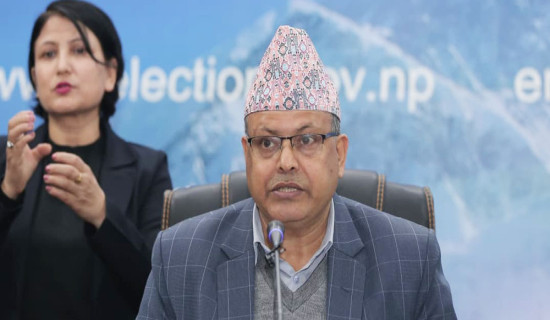- Saturday, 28 February 2026
Accountable, Inclusive Civil Service
After years of debate and deliberations, the Federal Civil Service Act is about to be endorsed and enacted. The Act is a legislative framework that regulates the civil service system under the federal structure introduced by the 2015 constitution. To implement the federal structure effectively, a new legal framework was required, replacing the older Civil Service Act, 1993 (2049 BS). The new Act is meant to define the roles, responsibilities, recruitment, promotion, transfer, and retirement of civil servants at the federal level, while separate laws govern provincial and local civil services.
This Act is essential for operationalising a professional, inclusive, and accountable bureaucracy at the federal level. The fundamental operation of civil service generally revolves around ensuring ethical, efficient, fair, neutral and impartial public administration. These principles include integrity, impartiality, accountability, transparency, and merit-based selection, among others. Essentially, civil servants are expected to perform with honesty, avoid conflicts of interest, take responsibility for their actions, be open about their work, and be hired and promoted based on their qualifications and abilities. They are public servants, and they must serve the public. The legal framework of the civil service must internalise these principles. This article seeks to assess the upcoming Federal Civil Service Act in the light of these principles.
Integrity
The first principle of civil service is integrity or honesty. It demands that civil servants always maintain the highest ethical standards in their attitude, conduct and decision-making. This includes being truthful, trustworthy, and avoiding any actions that could compromise their position or the public trust. Evidence suggests that bureaucrats are not up to this standard in Nepal. Although policies, laws and other institutional structures are in place to ensure the highest level of integrity among the civil officials, the enforcement and real practice are rather weak. The new Civil Service Act has brought new measures to enhance their integrity and honesty. Strengthened provisions for disciplinary action, code of conduct, and accountability mechanisms are just a few examples.
The second principle is impartiality or neutrality. It stresses that civil servants must act without bias or prejudice, ensuring that all citizens are treated equally regardless of their socio-economic backgrounds or political affiliations. They should also maintain political neutrality, meaning they do not allow their personal political views to influence their work or decision-making. Although the trade union right is provided to some of the lower-level civil servants, the code of conduct stated in the new act expects impartiality and neutrality.
The third principle of civil service is accountability. It argues that civil servants are responsible for their actions and decisions, and they must be able to explain their conduct to the public and their superiors. They should also be morally and spiritually accountable. This includes maintaining proper records through good conduct and being open to scrutiny as and when required. The new Act has several provisions to ensure accountability, such as being accountable to the supervisor and the law.
The fourth principle is transparency. The work of civil servants should be open and accessible to the public, fostering trust and allowing for oversight. This includes being clear about their processes, decisions, and the reasons behind them. The Act contains many provisions to maintain transparency, such as disclosing all decisions. Meritocracy is another principle. According to this, hiring, transfers and promotions within the civil service should be based on the predetermined qualifications, skills, and experience, rather than personal connections or political affiliations. This ensures that the most qualified individuals are selected for public service roles. The new Act has several provisions to ensure meritocracy, such as specific provisions for recruitment, transfers and promotions.
It also ensures representation of women, indigenous groups, Dalits, Madhesis, persons with disabilities, etc., as per constitutional provisions of creating an inclusive state. Inclusion is also competitive. There are also provisions for performance evaluation and career development as tests of meritocracy. Besides, civil servants should be dedicated to serving the public interest and upholding the values of the civil service. This includes being committed to providing efficient and effective services and acting with respect and courtesy towards citizens. While the service with a smile was tried to be kept in place in the past, citizen satisfaction is still to be improved with added care and dedication.
People-oriented Act
The new legal arrangement aims to make the civil servants more people-oriented rather than process-oriented, with many provisions, such as an annual contract, job description and performance evaluation. For this, civil servants should demonstrate competence, expertise, and diligence in their work. The provision of a leadership test is a good case here. The new Act provides them with a number of study and training opportunities within and outside the country. They should also strive to deliver services in a timely, cost-effective, and efficient manner, ensuring that public resources are used wisely. It also includes a list of negative incentives for those who fail to deliver public service efficiently.
Additionally, civil service should be able to adapt to changing needs and circumstances, embracing innovation and new technologies to improve public services. To uphold these principles, rules regarding retirement age, pensions, and other post-service benefits are provided in the newly proposed Act. There are also provisions to transfer and allow competition across the three levels of government under the federal set-up. In sum, civil service has a number of principles, which provide its identity and uniqueness as a permanent government. The new Act is expected to have taken into account these essential principles.
(Dr. Bhusal is a development expert.)
















